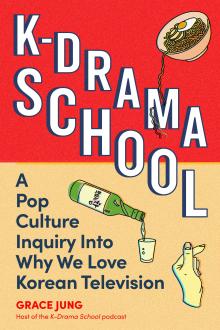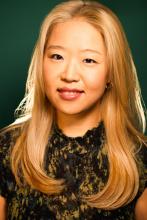
K-Drama School
Presented in partnership with the Center for East Asian Studies.
From the Emmy Award-winning Squid Game to streaming sensations like The Glory and Crash Landing on You, Korean television has emerged onto the global pop culture scene as compelling television—but what exactly makes these shows so irresistibly bingeable? And what can we learn about our societies and ourselves from watching them?
From stand-up comedian and media studies PhD Grace Jung comes a rollicking deep dive into the cultural significance of Korean television. K-Drama School analyzes everything from common tropes like amnesia and slapping to conspicuous product placements of Subway sandwiches and coffee; to representations of disability, race and gender; to what Korea’s war-torn history says about South Korea’s media output and the stories being told on screen.
With chapters organized by “lessons,” each one inquiring into a different theme of Korean television, K-Drama School offers a groundbreaking exploration into this singular form of entertainment, from an author who writes with humor and heart about shows that spur tears and laughter, keeping us glued to the TV while making fans of us all.
Shows discussed include: Squid Game, SKY Castle, Crash Course in Romance, Extraordinary Attorney Woo, My Mister, Something in the Rain, One Spring Night, DP, Guardian: The Lonely and Great God, Autumn in My Heart, Winter Sonata, Our Blues, and more.
Grace Jung

Grace Jung is a stand-up comedian, writer, filmmaker, scholar and podcaster. She is the author of K-Drama School based on her podcast K-Drama School with appearances on NPR, The Bechdel Cast, The SteeBeeWeeBee Show, They Call Us Bruce and season 4 of The Joe Schmo Show on TBS. She and her work are featured in Time, Publishers Weekly, Asymptote, The Economist, NBC, The Offing Magazine, Literary Hub, and LA Review of Books. Grace is a former Fulbright scholar and recipient of the Academy of American Poets Prize. She has a PhD in Film and TV from the University of California, Los Angeles. Her research is in Korean television, film, gender, queerness and clown theory. She is currently a Visiting Assistant Professor in Korean Studies at UW-Madison.
